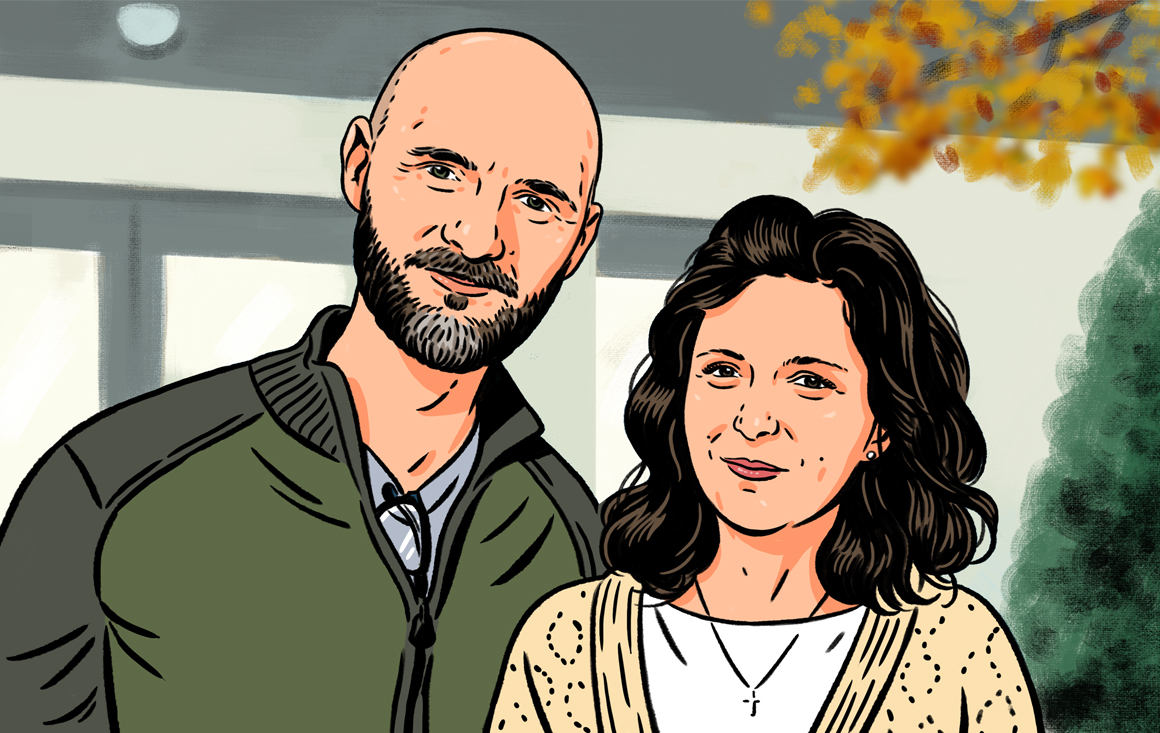‘Hands That Are Helping’

Over the last decade, the number of refugees fleeing war, violent crime, regime change, poverty, persecution, and climate disasters has risen exponentially across the world. It’s a trend that husband-and-wife duo Cătălin and Bianca Albu have seen firsthand as managers of the Jesuit Refugee Services (JRS) chapter in Romania.
Before Russia invaded Ukraine in 2022, JRS Romania served around 10,000 refugees a year, primarily from Syria, Iraq, and Afghanistan. However, since the war began, that number has quadrupled and with that, their emotional needs were also greater.
“People were coming to us in shock—which was so different from when you meet someone who has come from far away and has already somewhat processed their trauma and internalized it,” Bianca remembers.
Many, she adds, lived in denial of their refugee status, believing that the war would soon end and they would return home. Almost three years later, those hopes remain unfulfilled.
Today, JRS is Romania’s largest church-based responder to the Ukrainian crisis, and unlike other organizations, it leans on its Jesuit roots to care for the whole person. Its services include legal guidance, accommodation, mental health care, language classes, professional development, and other financial and community integration support. The idea is not just to offer a life preserver during a crisis, but to provide the tools needed to rebuild after leaving home behind.
In recognition of its dedicated, person-first service, JRS Romania was selected as a finalist for the 2024 Opus Prize, which will be hosted by Santa Clara Unviersity from November 11 to 15. The Opus Prize is given annually to recognize unsung heroes, anywhere in the world, solving today’s most persistent social problems.
“What we are trying to do at JRS is emphasize human interaction and connection, because to give any less is insufficient compared to the need, which has been so great,” explains Cătălin. “It doesn’t matter if you help three people or 40,000. It’s about doing the right thing for each person.”
Accompanying with dignity
If you ask Cătălin and Bianca about what brought them to refugee aid, the word “justice” comes up time and time again.
“We’ve always had this sense that if some injustice is happening to somebody, we have to act. We don’t have a sword like in the olden times, but if we had a sword, we would take it out and fight for them,” says Cătălin, who was inspired to become a lawyer after witnessing the biases his stepfather, an Iraqi refugee, faced when he came to Romania.
After struggling with the “ugly side” of the justice system, he felt he could have a greater impact at an NGO. That’s where he met Bianca, who shared his passion—the rest, they say, is history.
“Now, after twenty years working together, we are still the best team,” Cătălin adds. “She supports me as much as I support her because we respect and understand the importance of our work.”
Since taking leadership roles at JRS, years of challenges gave the Albus the tools to deal with the complex needs now facing Ukrainian refugees with creativity and respect.
For example, Cătălin says, many highly-skilled refugees were unable to continue the successful careers they left behind in Ukraine and had few options aside from cleaning houses for a living or waiting in lines for food. So, JRS Romania created work opportunities for these talented individuals, employing over 150 Ukrainian teachers, psychologists, and lawyers last year.
In that time, Bianca has heard many of her colleagues’ stories and shared their grief, from husbands or brothers who’ve died in the army to the struggle of raising children or going through chemotherapy alone in a foreign country.
“This has taught us how to accompany our staff with dignity, how to help them spread their wings,” she explains. “We invested in their Romanian language classes. We helped translate diplomas and recommendation letters. We are there to offer any support they ask for.”
In between God and people
While the organization received massive international support early in the war, donations have started to wane, even though the Ukrainian war is far from over. But despite these financial and bureaucratic hurdles, Cătălin says that he and Bianca “have the guts and the will” to continue this necessary work—work that they feel is bigger than them.
“For many years, we very much believed in that phrase, ‘the hands that are helping are holier than the hands that are praying,’” says Bianca. “But I think we’ve changed that perspective because of the many miracles we’ve witnessed.”
For example, she says, during the height of the pandemic, despite the large numbers of people in their refugee centers and against all logic, no one got sick.
From big moments like this to little moments of unexpected generosity, Bianca has been touched by this sense of something at work beyond her helping hands. So, when her colleagues in Ukraine ask her to pray for them, she does, because: “I do not know where the next bomb is going to hit, but the least I can do is to accompany them with a prayer.”
“When you witness things like these, you feel that you are somehow in between God and people,” Bianca continues. “Now, I think no hands are more holy than others. We need both. All you need to do is put yourself in the middle so that God can work in the world and help those in need. If you open yourself up to this, I truly believe good things will happen.”
The Opus Prize is an annual award recognizing organizations who champion faith-filled change. The Opus Prize is given not only to expand the humanitarian efforts of the recipient, but to inspire others to pursue lives of service. The combined awards make up one of the world's largest faith-based awards for social entrepreneurship. Santa Clara will host the Opus Prize event Nov. 11-15.


